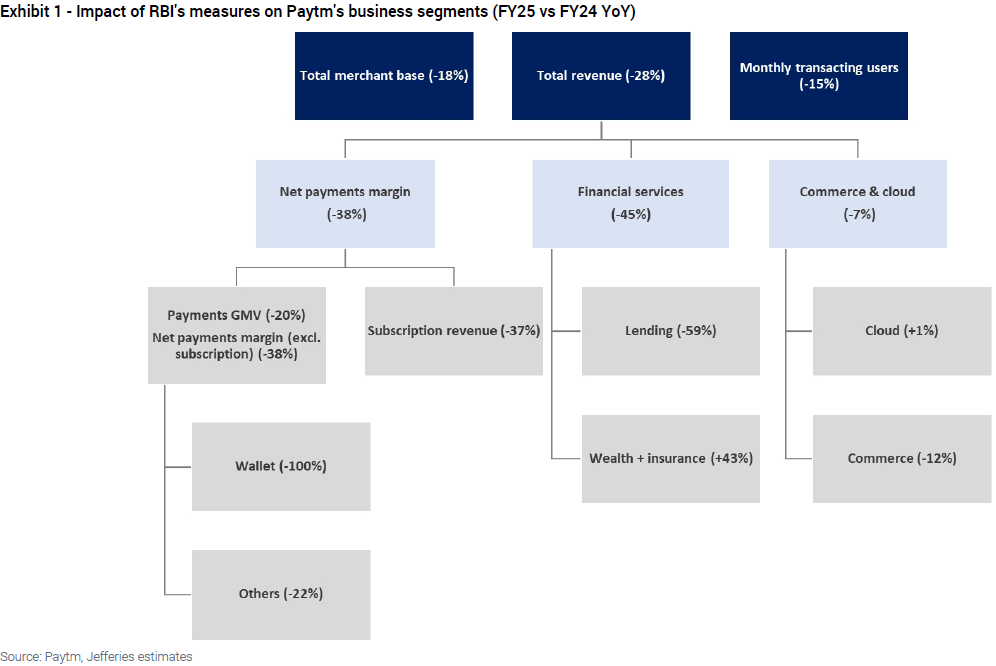SUMMARY
The stock touched the upper circuit of 5% on the BSE in the second consecutive trading session following RBI providing more clarity to its clampdown on the payments bank by releasing FAQs and extending the deadline on the business restrictions
Besides, Paytm on Friday said that it shifted the nodal account of Paytm Payments Bank to Axis Bank, which further added some optimism
Jefferies has stopped rating the Paytm stock amid constant news flow but factoring in the direct and indirect impact, the brokerage sees a 28% YoY decline in its FY25 revenue
Shares of fintech major Paytm opened Monday’s (February 19) trading session 5% higher, touching the upper circuit at INR 358.55 on the BSE, registering the second consecutive day of steady gain.
Amid the ongoing regulatory crisis at Paytm Payments Bank, shares of Paytm’s parent entity One97 Communications have been extremely volatile over the past few weeks, and the stock price has more than halved since January 31.
However, the shares of Paytm have gained some respite after RBI on Friday (February 16) provided more clarity to its clampdown on the payments bank by releasing frequently asked questions (FAQs) on the issue and extending the deadline on the business restrictions to March 15 from February 29 earlier.
The central bank also clarified that Paytm QR codes, soundboxes and card machines would continue to be operational post the March 15 deadline, given the merchants migrate to other banks.
Besides, Paytm on Friday said that it shifted the nodal account of Paytm Payments Bank to Axis Bank, which has further added to some optimism. However, it is also true that without a banking license, Paytm’s business model would now become similar to pure payment service providers like PhonePe, GPay and others.
The RBI on January 31 issued a notification barring Paytm Payments Bank from any deposits or credit transactions, or top-ups in any of its customer accounts. The central bank also stopped the company from providing any banking services including UPI facility and fund transfers after February 29.
Meanwhile, multiple brokerages have downgraded shares of Paytm since then, projecting an adverse impact of the regulatory turmoil on the company’s customer base and overall revenue.
In its latest research note, brokerage Jefferies has suspended its rating on Paytm until the news flow settled down. The brokerage also removed its price target (PT) on the stock.
It had set a PT of INR 500 on Paytm and downgraded the stock to an ‘underperform’ rating, earlier this month.
“In case of no incremental regulatory clampdown, there could be multiple scenarios for the business depending on user/merchant retention. We see +ve & -ve risks arising from user/merchant retention, revenue traction and cost-controls,” Jefferies said.
lockquote>
“On the basis of merchant/user attrition to the tune of 10-30% and a hit to net revenues (adjusted for payments interchange) of 20-45%, valuation could vary widely.”
Given news on regulatory actions on other pending issues is still incoming, the brokerage has moved to ‘not rated’ until the news flow settles down, it said.
Jefferies in its research report noted that RBI’s FAQs reiterate the winding up of Paytm Payments Bank’s business but platforms outside it – Paytm app, UPI transfers, merchant payment and loan originations – can continue to operate. Factoring in the direct and indirect impact, the brokerage sees a 28% YoY decline in its FY25 revenue that pushes Paytm into cash burns.
“Paytm’s focus will now move to ensuring customer/merchant retention, and we believe it will dip into its INR 85 Bn (INR 8,500 Cr) cash reserves for spends on retaining users,” Jefferies said
Besides, the brokerage stated that clarity is still awaited on two key issues – RBI’s view on method of transition for the virtual payment address (VPA) handle of Paytm users and the outcome of Enforcement Directorate investigations.
Jefferies also believes that in the medium term, government approval for a payment aggregator license to the subsidiary Paytm Payments Services Limited would be important to monitor.
On the other hand, Bernstein said in a new research report that it finds the FAQs provided by the RBI “incrementally positive” though it’s still short on the finer details.
lockquote>
The extension of the deadline to March 15 provides Paytm with a slightly longer window to execute the changes required to ensure a smooth transition out of Paytm Payments Bank, said the brokerage.
“There was no explicit exception provided for a bulk transfer of wallets/FASTags to another bank and hence these products will cease to exist — this was a largely expected negative,” Bernstein added.
However, the report showed that the brokerage maintained its ‘’outperform’ rating on Paytm and a PT of INR 600, which currently implies an upside of almost 76% to the stock’s last close.
Disclaimer
We strive to uphold the highest ethical standards in all of our reporting and coverage. We StartupNews.fyi want to be transparent with our readers about any potential conflicts of interest that may arise in our work. It’s possible that some of the investors we feature may have connections to other businesses, including competitors or companies we write about. However, we want to assure our readers that this will not have any impact on the integrity or impartiality of our reporting. We are committed to delivering accurate, unbiased news and information to our audience, and we will continue to uphold our ethics and principles in all of our work. Thank you for your trust and support.




![[CITYPNG.COM]White Google Play PlayStore Logo – 1500×1500](https://startupnews.fyi/wp-content/uploads/2025/08/CITYPNG.COMWhite-Google-Play-PlayStore-Logo-1500x1500-1-630x630.png)